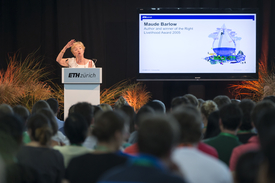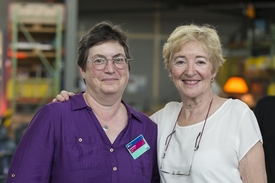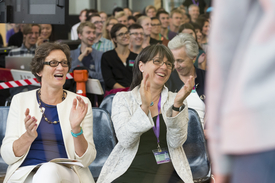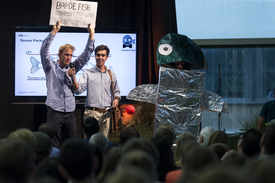Archive detail
ETH Week 2016 on Water: the journey is the goal
September 27, 2016 |
The Week is part of the “Critical Thinking” initiative of the ETH. In 18 interdisciplinary groups the students learned to define problems and to present complex issues attractively. The public should be able to understand why their work is relevant and how one can solve the problem – once recognized – in the real world. At the end of the Week a jury gave awards to the best projects. More important than the solutions, however, was the learning process.
One of the participants was Mizuho Kamei from Japan. She is a student of pharmaceutical sciences in Hokkaido and is spending a year at the ETH Zurich. As Japanese students are usually shy and reluctant to ask questions, the ETH Week was a major challenge for her. Looking back she says, “I learned to work and to communicate with students in other departments and from other countries. I would definitely take part again and I recommend it to everyone.”
In order to make sure that the students understood the learning process and didn’t get sidetracked, they were accompanied by tutors. Imanol Zabaleta, who works as project leader in the Sandec department at Eawag, took part as tutor for the second time. “For me, the ETH Week is an excellent opportunity to train my own leadership abilities, to work with students and to get better acquainted with the ETH as an institution.”
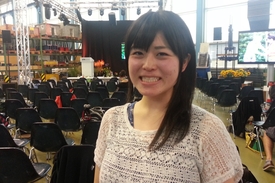
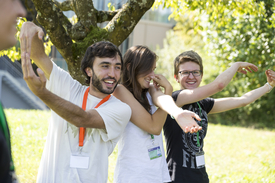
Fig. 2: Mizuho Kamei, Japanese ETH student of pharmaceutical science. (Photo: Martina Schürmann). Fig. 3: Imanol Zabaleta, environmental engineer and researcher at Sandec (Eawag). (Photo : ETH / Alessandro Della Bella)
Water as a resource and the role of research
The theme of the Week was water as a resource, which is being placed under greater and greater pressure as a result of climate change and increased demand. According to Unicef and WHO evaluations, more than 700 million people have no access to clean drinking water. Not only health risks but also conflicts are the result.
In 2010, the United Nations recognized water and sanitary provision as human rights. Visiting speaker Maude Barlow, chairman of the “Council of Canadians”, explained to the students why it is important that the right to water is now also part of national laws.
The author and winner of the Right Livelihood Award 2005 also visited Eawag and spoke about the role of research in solving the worldwide water crisis. In addition to social and political aspects it is of major importance to protect water as a resource and fight against its misuse. To guarantee this, water experts should share their data and their knowledge with the public and ask critical questions.
Fig. 4: Maude Barlow is a Canadian author and winner of the “Right Livelihood Award 2005”. As founder of the “Blue Planet” project, she applies herself actively for the human right to water. Fig. 5: Janet Hering, director of Eawag, and Maude Barlow during the ETH Week. (Photos : ETH / Alessandro Della Bella)
Challenges in the area of water demand interdisciplinary cooperation
The students gathered knowledge about the challenges associated with water as a resource and the possible solutions on eleven different excursions. At the Forum Chriesbach and the research platform Nest they learned how a sustainable handling of building materials, energy and water is possible in practice. Eawag, for example, saves water and wins valuable nutrients from urine with its urine-diversion toilets.
Eawag researchers and other national and international water experts helped the students to understand the complex and interdisciplinary subject area and to define problems. Eawag researchers who contributed to the ETH Week were Bernhard Wehrli, Eberhard Morgenroth, Max Maurer, Christian Zurbrügg, Isabell Köpping, Urs von Gunten, Klement Tockner, Andrea Popp, Roni Penn, Sabine Hoffmann, Ulrike Feldmann, Regula Meierhofer und Max Friedrich.
Practical solutions
After six days of intense work, three of the 18 projects presented were selected for awards. The prize for the most inspiring story went to the “Save-o-Pillar” project. The apparatus developed animates the consumers with positive feedback in order to reduce their virtual water use.
The award for the most fascinating science was won by the project “Make grey water great again”. The idea of using shower water once again to flush the toilet can reduce water consumption in private households by 20%.
The award granted by the students went to the project “Smart Fish”. In this project, fish with attached sensors can collect geoecological data in Swiss waters.


